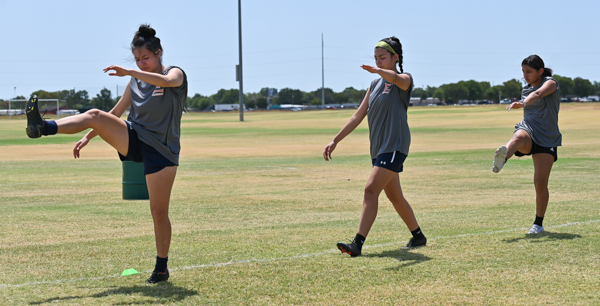Showers give respite from constant heat
August 18, 2022
After 45 days of heat over 100 degrees, Dallas County is feeling some relief with lower temperatures and scattered thunderstorms this week.
In July, 27 days out of 31 were above 100 degrees, according to the National Weather Service.
According to Allison Prater and Madi Gordon, National Weather Service meteorologists, it was the fourth-hottest July on record. The hottest was 1980 when all 31 days were 100 degrees or higher.
“For the number of 100-degree days, we are ranked seventh for the greatest annual,” Gordon said.
2021 is ranked second for consecutive days without precipitation. An Aug. 10 storm broke a streak of 67 days.
“The streak ended at 67 days from June 4 to Aug. 9,” Gordon said. “We received rainfall on Aug. 10, which ended the consecutive days without measurable precipitation, but this still does rank second. The second-highest and second-longest range restrict.”
The Dallas-Fort Worth area did not receive any precipitation in July. The total precipitation for the year stands at 12.82 inches, while normal precipitation for this time of the year is around 24 inches.
“We’re down about a little over 10 inches, so we’re below normal for this time of year,” Prater said.
The resulting drought-like conditions caused blazes such as a July 25 brush fire in Balch Springs, burning 26 homes and leaving several homeless. Volunteers from Eastfield’s food pantry joined assistance efforts for the affected homeowners.
According to the National Weather Service, Texas initially broke 95 degrees on May 3, 2021, while this year it was on March 27. Many students and faculty have changed their routines to avoid the heat.
Mari Vega, who works at the Financial Aid office at Eastfield, said that the heat has made it harder to do activities outside.
“It’s too hot to be outside so long,” Vega said. “It’s kind of hard to walk the dog unless you’re in the shaded area.”
Vega enjoyed walking around the campus buildings, but she currently avoids going outside due to the weather.
“I think that’s one thing it has affected,” Vega said. “I’ve kind of tried to go inside the building.”
Dulce Andrade, a science major, says the heat has not affected her but it has changed the way her dog behaves.
“We put him inside more now,” Andrade said. “He’s usually more outside but now we had to make a space inside the house for him.”
The National Weather Service projects 90-degree heat to continue throughout August. The National Center for Environmental Health has posted recommendations to combat the heat and stay safe from heat-related ailments.
- Stay in indoor locations.
- Drink plenty of fluids even if not feeling thirsty.
- Wear loose, lightweight, light-colored clothing and sunscreen.
- Never leave children or pets in cars.
- Check the local news for health and safety updates.





